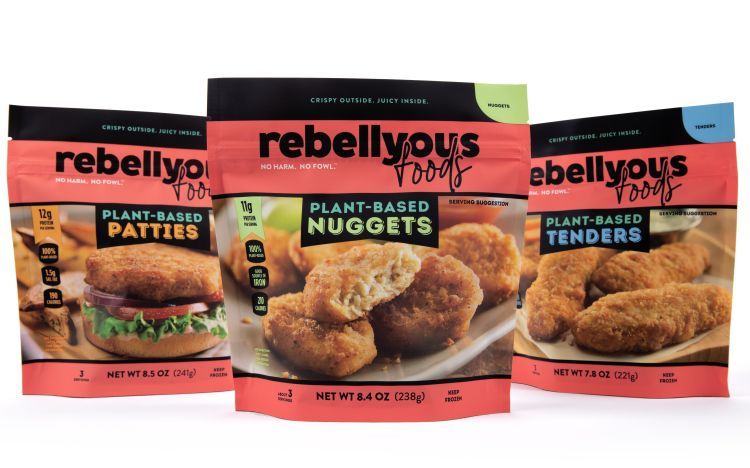Two of the biggest hurdles facing plant-based meat, says Rebellyous Foods, are price and quality-at-scale, which the Seattle-based startup is tackling head-on with technology it claims can dramatically increase yields and improve quality, enabling it to reach cost parity with animal-based chicken by 2024.
Founded in 2017 by former Boeing engineer Christie Lagally, Rebellyous Foods last week announced $9.5 million in equity financing backed by Cercano Management and Aramana LLC in the first tranche of a Series B round in which it hopes to raise up to $30.7m, according to a February 3 US Securities and Exchange Commission filing.
The money will enable it to install the next generation of its technology—the ‘Mock2’—at its production facility in Seattle in November, allowing it to produce 2,500 lbs of plant-based chicken an hour (vs 100 lbs today) in a continuous rather than a batch process, increasing yields and reducing labor costs, Lagally tells AFN.
“Investors understand the drivers behind meat alternatives are still there. We need to address climate change, human health, and animal welfare, but we have to find a way to make products at price parity and profitably. We entered this fundraising round with the right technology to address the biggest problem in the market: price,” she says.
The challenges of the ‘mix & form’ batch approach to plant-based meat production
Right now, claims Lagally, most firms making plant-based chicken nuggets are deploying a labor-intensive ‘mix and form’ batch process that involves three steps: hydrating texturized plant protein; mixing a combination of oils, waters, starches, and other ingredients; and then combining the hydrated textured vegetable protein (TVP) and the gloopy binding mixture to make a dough. This is then formed into nuggets, which are breaded and fried.
While elements of this can be mechanized, it’s not very scalable, because there is a limit to the batch size, claims Lagally, who raised around $20 million prior to the latest funding round.

The more water the TVP absorbs, the more it weighs down on itself and pushes water out, limiting the batch size, she says. Mechanizing the mixing process, meanwhile, creates heat, so firms either do it manually or add ice or freeze the room to keep temperatures down, which adds expense.
Mixing the hydrated TVP and the binder is also challenging, because the dough is so viscous, which means it has to be mixed for longer, creating heat, which reduces quality and in turn limits the batch size. A percentage of each batch also remains stuck to the size of the mixer, generating waste.
The advantages of a continuous approach
Rebellyous Foods’ chilled automated system, by contrast, enables the production of plant-based meat on a continuous basis, she explains.
This means you don’t have the problem of more hydrated TVP decreasing the quality of the rest of the TVP, or the emulsion working unevenly so that only parts of the final dough are fully emulsified.
As it’s a continuous process, you don’t have the problem where mixing the final dough makes it hotter and hotter because you’re not mixing the same material over and over again in one batch, says Lagally, who said her ‘Mock2’ line can reduce labor costs (through automation), cut energy costs (by eliminating the need for a chilled environment), cut sanitation costs, reduce waste, and eliminate re-work.
‘This is going to break the barrier wide open and democratize plant-based meat’
Being able to offer lower prices next year will make a significant difference, predicts Lagally, who currently supplies 109 school districts under the USDA National School Lunch Program feeding 2 million+ students across the country and 1,100 retail locations primarily in the Pacific Northwest with breaded nuggets, tenders, and patties.
“We’ve done over $2.6 million in sales since the middle of 2021, 90% of which are from schools,” says Lagally, who says schools are seeking out plant-based options because more students are vegans and vegetarians or have religious dietary concerns, in order to meet climate targets, or simply because many children prefer them.
“The vast majority of school districts in the US have a very limited budget,” she says. “But by January 2024, we will be able to drop the cost of our products to the same or even a little less than the price of [animal-based] chicken products.
“This is going to break the barrier wide open and democratize plant-based meat.”

Plant-based meat: ‘Retailers are feeling very burned’
As for retail customers, she says, “Retailers are feeling very burned. They invested heavily in getting a lot of products in the store and then inflation hit and consumers prioritized other products. But if we can get the price down, things will change.”
The argument that consumers are rejecting plant-based nuggets because they’re too processed doesn’t hold a great deal of water, she claims.
“We’re replacing processed animal-based meat with processed plant-based meat. As we say to our school lunch customers, if you’re going to buy chicken, ours has no cholesterol, lower saturated fat, and lower sodium.”





